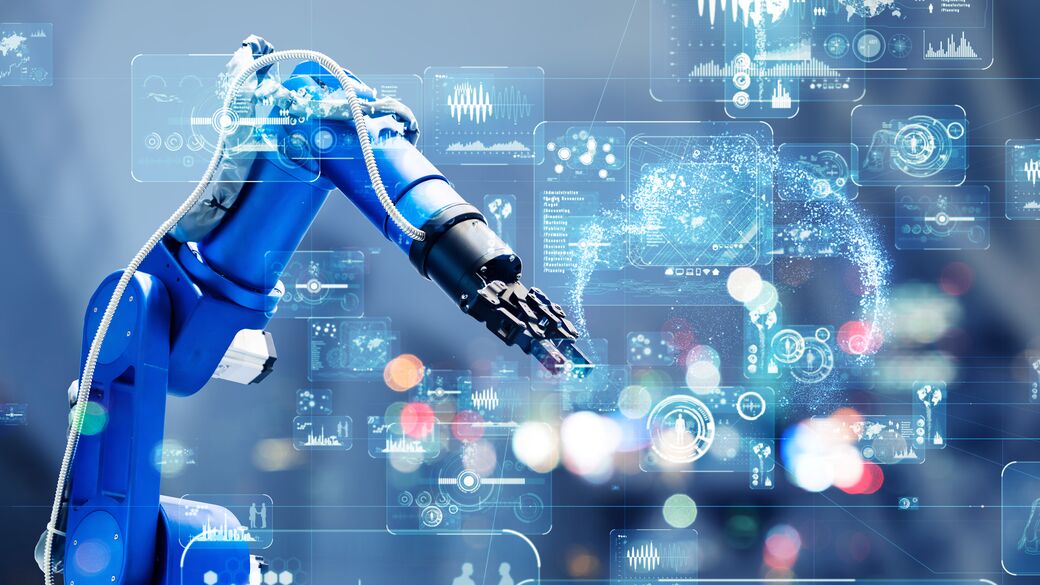
AI is reshaping traditional processes and unlocking new potential. With two decades of rapid advancement since the turn of the century, manufacturing organizations are now at various stages of AI adoption, ranging from initial explorations to full-scale implementations. This evolution is not just about adopting new technologies, but also fundamentally altering how businesses operate and compete in today's dynamic environment.
As manufacturing organizations scale their AI maturity, they unlock new opportunities for growth, competitiveness, and sustainability. The journey toward AI adoption in manufacturing involves not only implementing advanced technologies, but also fostering a culture of innovation, collaboration, and adaptability.
The journey towards AI maturity in manufacturing involves several stages, each building upon the other to create a robust and efficient AI ecosystem. At the initial level, organizations start by experimenting with AI technologies, conducting pilot projects, and assessing their feasibility and impact. As they gain confidence and experience, they move towards scaling AI applications across different departments and processes, integrating AI-driven insights into decision-making at all levels. Finally, mature organizations leverage AI as a strategic asset, continuously innovating and evolving their AI capabilities to stay ahead in the competitive landscape.
Manufacturing organizations worldwide are actively pursuing AI adoption, either by establishing dedicated AI departments or by exploring and experimenting with AI applications within their existing operational frameworks. The goal is to leverage AI's capabilities to drive efficiency, improve decision-making, and gain a competitive edge in the market.
One of the primary drivers behind the accelerated adoption of AI in manufacturing is the quest for operational excellence. AI-powered solutions enable manufacturers to optimize production processes, streamline supply chain management, and enhance overall operational efficiency. For example, predictive maintenance algorithms can analyze equipment data in real-time to predict potential failures, thereby minimizing downtime and reducing maintenance costs.
Several key factors have propelled the journey to widespread AI adoption in manufacturing. Firstly, advancements in AI algorithms, particularly deep learning, have unlocked unprecedented capabilities in data analysis and pattern recognition. This has empowered manufacturers to extract actionable insights from vast amounts of data, leading to more informed decision-making.
As AI technologies evolved and became more sophisticated, manufacturers have started integrating AI across their entire value chain. This holistic approach to AI adoption involves leveraging data from multiple sources, including Internet of Things (IoT) sensors, production equipment, and enterprise systems, to gain valuable insights and drive data-driven decision-making.
Furthermore, partnerships between manufacturing organizations and ERP providers like Epicor that are leveraging AI have played a crucial role in scaling AI maturity. By leveraging external expertise and innovative AI technologies, manufacturers can accelerate their AI adoption journey and stay ahead of the competition.
Additionally, the proliferation of connected devices and sensors across production lines has created a rich data ecosystem. AI thrives on data, and the abundance of real-time data streams in manufacturing has provided fertile ground for AI applications in predictive maintenance, quality control, and supply chain optimization.
The competitive pressures in the global manufacturing landscape have also incentivized companies to embrace AI as a means to stay agile, reduce costs, and deliver superior products and services to customers. AI's impact on the manufacturing industry is profound and multifaceted, offering unprecedented opportunities for innovation and efficiency. By scaling AI maturity, understanding its evolution, charting a forward-looking road map, and prioritizing key considerations, companies can harness the full potential of AI to drive sustainable growth and value creation for the organization.